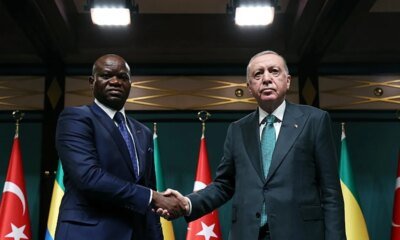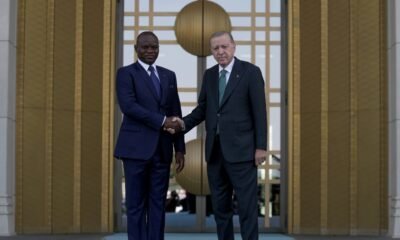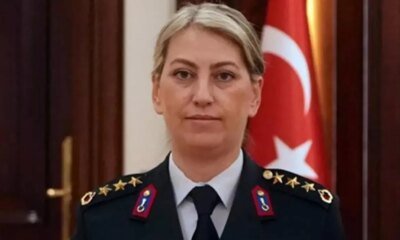Politics
Erdoğan urges Gaza cease-fire in talks with Italy, Libya leaders
President Erdoğan called for an urgent cease-fire in Gaza and renewed support for a Palestinian state based on 1967 borders during a trilateral summit in Istanbul with Italy’s Prime Minister Giorgia Meloni and Libya’s Prime Minister Abdul Hamid Dbeibah, also addressing migration and regional cooperation, the Presidential Communications Directorate said.
The summit focused on cooperation between the three countries and regional issues.
During the meeting, Erdoğan underlined the importance of joint efforts by Türkiye, Italy and Libya in addressing the challenges facing the Mediterranean basin, including irregular migration. He stressed that long-term, sustainable solutions are needed to tackle the root causes of irregular migration, calling for greater multilateral coordination.
It was agreed that cooperation committees would convene first, followed by a leaders’ meeting to review decisions taken.
Highlighting Israel’s genocidal attacks in Gaza and the ongoing humanitarian tragedy, Erdoğan reiterated that the international community bears a major responsibility to ensure an immediate cease-fire and swift delivery of humanitarian aid to the region. He emphasized that a lasting solution can only be achieved through the establishment of an independent, sovereign and geographically contiguous State of Palestine within the 1967 borders, with East Jerusalem as its capital.
It was decided during the summit that the leaders would meet to discuss the decisions taken following the convening of the cooperation committees, the statement noted.
Rejecting international calls for a ceasefire, the Israeli army has pursued a brutal offensive on Gaza since Oct. 7, 2023, killing more than 60,000 Palestinians, most of them women and children. The relentless bombardment has destroyed the enclave and led to food shortages.
Libya’s National Unity Government seeks support for joint strategic projects
Libya’s Government of National Unity also issued a statement after the summit, stating that the talks addressed regional cooperation, stability, and economic integration in the Mediterranean, emphasizing the importance of supporting joint strategic projects.
The statement noted that economic cooperation opportunities were also discussed at the summit.
It emphasized the importance of connecting Libya to regional projects in the Mediterranean, as well as strengthening partnerships in energy, oil and gas, and infrastructure; investing in ports; developing electricity networks; and supporting joint strategic projects.
Noting Dbeibah’s call for increased regional coordination in combating smuggling networks and illegal activities at the summit, the statement said the Libyan premier also urged a quadripartite ministerial meeting consisting of Libya, Türkiye, Italy, and Qatar to initiate joint projects in this regard and to combine efforts on priority issues.
Politics
Türkiye must brace if Israel-Iran war flares up again: Report
Türkiye must develop a multifaceted strategy to be prepared in case another war flares up between Israel and Iran, a new report from the National Intelligence Academy (MIA) has warned.
In its report, titled “The 12-Day War and Lessons for Türkiye,” the MIA analyzed the June 13-24, 2025 conflict between Israel and Iran, detailing its military, intelligence, political and technological dimensions while outlining strategic takeaways for Ankara.
The short but intense war, which quickly shook regional balances, was assessed from a broad perspective, from air superiority to cyberattacks, and from manipulation of public opinion to implications for the defense industry. The study also examined the likely trajectory of the Iran-Israel rivalry and set out measures Türkiye should adopt in preparation for potential scenarios.
The report underscored that Türkiye’s defense industry has become a priority target for foreign intelligence services and urged the adoption of preventive security policies to safeguard sector actors. It stressed that critical personnel training, early warning systems and digital protection measures will be decisive in future wars.
According to the MIA, the 12-day war was a striking example of new-generation warfare capable of producing profound effects in a short span. The conflict began with Israeli surprise airstrikes and assassination operations, culminating in U.S. strikes on Iranian nuclear facilities.
The report highlighted the decisive role of modern warfare technologies, especially airborne elements, and emphasized the growing importance of cyberwarfare, electronic attacks and digital manipulation of public opinion.
Israel’s long-standing intelligence and operational networks inside Iran were described as a key factor in its military successes, illustrating how modern intelligence structures can directly shape the course of war.
Lessons for Türkiye
The report noted that Iran tried to offset Israel’s advantages through advanced hypersonic missile capabilities but achieved limited results against Israel’s layered air defense systems.
Even so, Israel’s difficulty in intercepting these missiles despite its technological edge demonstrated, the report said, the need for Türkiye to prepare for similar threats by modernizing its air defenses and boosting anti-missile capabilities.
The war was also fought in the digital sphere. Both sides carried out cyberattacks to damage infrastructure and sway public opinion. Iran’s blocking of platforms such as WhatsApp revealed the psychological dimensions of such conflicts, reinforcing the importance for Türkiye of digital security, critical infrastructure protection and domestic software use.
Civil defense capacity
Civilian casualties in Iran, particularly in Tehran, were attributed to inadequate early warning systems and shelter infrastructure. In contrast, Israel avoided similar losses thanks to advanced civil defense systems.
The MIA stressed that Türkiye should develop comparable capabilities for its major cities, warning that civil defense capacity will be vital in any future conflict.
The report reaffirmed the importance of integrating manned and unmanned aerial systems in Türkiye’s air force and called for domestic solutions for military use of civilian technologies. It also stressed the need to boost mass production capacity and adopt long-term, multifaceted defense planning.
If diplomacy in Iran fails, the report cautioned, regional instability will be unavoidable, potentially triggering mass migration toward Türkiye, disrupting energy supplies and creating border security risks.
The conclusion was that Türkiye must be ready for these eventualities, militarily, digitally and strategically.
Politics
FM Fidan, Saudi counterpart discuss Palestinian statehood
Foreign Minister Hakan Fidan and Saudi Foreign Minister Prince Faisal bin Farhan Al Saud discussed the situation in Gaza and steps to be taken for the recognition of Palestinian statehood in a phone call on Friday, foreign ministry sources said.
The two foreign ministers also discussed the steps that could be taken toward the recognition of the State of Palestine within the framework of the resolution adopted by the U.N. General Assembly.
On Thursday, Türkiye welcomed recent steps taken to recognize a Palestinian state by France, Britain, Canada and others.
The moves have come as international concern and criticism have grown as starvation and famine are taking place in Gaza and Palestinians are not getting food due to the Israeli blockade.
The leading international authority on hunger crises this week said Israel’s military offensive and blockade have led to the “worst-case scenario of famine” in the territory.
Last week, French President Emmanuel Macron announced his country, a heavyweight in the EU, would officially recognize a Palestinian state at the United Nations General Assembly in September, becoming the first major Western power to do so.
About 144 of the 193 member states of the U.N. recognize Palestine as a state, including most of the global south as well as Russia, China and India.
Fidan and his Saudi counterpart also exchanged views on the latest situation in Syria, the sources said.
Türkiye and 10 Arab countries recently reiterated their commitment to Syria’s sovereignty, unity, stability and security, denouncing foreign interference and condemning ongoing Israeli strikes.
Ankara also played a key role in establishing the cease-fire in Syria after Israeli airstrikes targeted the capital, Damascus, as well as Suwayda and Daraa, on the pretext of protecting the Druze community.
Türkliye views Syria as a neighbor it intends to stand by during its reconstruction and reintegration into the international fold.
Politics
Italy praises Türkiye’s cooperation in migration management
Italy on Friday hailed Türkiye’s cooperation in curbing irregular migration, saying it has delivered “excellent results,” according to an official statement.
In a statement, the Italian government said that Italian Prime Minister Giorgia Meloni, Turkish President Recep Tayyip Erdoğan, and Prime Minister of Libya’s National Unity Government Abdul Hamid Dbeibah discussed strengthening cooperation to address common challenges, beginning with the management of irregular migration flow.
It came during the three leaders’ trilateral summit in Istanbul.
During the meeting, Meloni emphasized “the excellent results achieved in this regard with Türkiye,” as well as the opportunity to build on the lessons learned, including by applying them to support the Libyan Government of National Unity’s migration efforts.
“In this context, President Meloni discussed with her interlocutors a series of measures to fight international criminal networks of human traffickers, improve work to prevent irregular movements, and support Libya in managing the migration pressure it is facing,” it added.
The statement mentioned that Meloni also reaffirmed Italy’s commitment to Libya’s stability, unity, and independence, as well as its support for a political process led by Libya and facilitated by the United Nations that can result in elections.
The three leaders agreed to immediately resume work on a technical level to identify concrete actions to be carried out collaboratively within a clearly defined time frame.
According to a statement from Türkiye’s Communications Directorate, the Turkish president emphasized the importance of cooperation among the three countries in addressing the Mediterranean region’s challenges, including irregular migration movements.
Following the summit, Libya’s Government of National Unity issued a statement, stating that the meeting addressed regional cooperation, stability, and economic integration in the Mediterranean, stressing the importance of supporting joint strategic projects.
Politics
Greece’s island militarization raises red flags for Türkiye
Greece on Monday announced radical plans to deploy what it called “self-sufficient” army units on the Aegean islands, some of which sit as close as 1,575 meters (5,165 feet) to Türkiye. The plan, part of the so-called “Agenda 2030,” aims to make front-line formations nearly autonomous, capable of growing their own food, generating their own energy and operating without needing orders or resupply from central command.
The move, primarily meant to counter Turkish elements while ensuring Greek supervision in the Aegean, raises several red flags for Türkiye and carries the risk of tempting a response that could upend already fragile balances between the Eastern Mediterranean neighbors.
Turkish defense experts argue Athens’ move, on islands that are required to remain demilitarized under international treaties, goes beyond a defensive upgrade and ventures into an aggressive posture aimed at Türkiye.
Retired Rear Adm. Cihat Yaycı, a prominent architect of Türkiye’s maritime doctrine “Blue Homeland,” called the plan “a clear violation of international law” and a “new manifestation of Greece’s lawless approach.”
The 1923 Treaty of Lausanne and the 1947 Paris Peace Treaty granted Greece sovereignty over 23 islands only on the strict condition that they would remain non-military in status.
“Greece has violated the very condition under which sovereignty was transferred,” he said in an exclusive interview with Daily Sabah, pointing to the deployment of military assets, airports, tanks and anti-drone systems as illegitimate.
“These developments must be read not as isolated defense upgrades but as part of a larger effort to undermine the non-military status of the islands through the use of civilians and pseudo-civilian structures,” Yaycı added. “This opens the door to contesting Greek sovereignty over these islands under international law.”
While Türkiye has long expressed concern over the militarization of islands in the Aegean, Yaycı emphasized that the new Greek doctrine signals an unprecedented shift toward operational independence, evoking not just legal concerns but potential security threats.
“This step by Greece constitutes a direct sign of aggression,” he said. “It has nothing to do with good neighborly relations or alliance solidarity within NATO.”
Echoing this assessment, Murat Aslan, a security analyst at Turkish think-tank Foundation for Political, Economic and Social Research (SETA) and former Turkish military officer, noted that the concept of “autonomous army units” poses a serious risk to Türkiye’s regional security.
“If any of these islands, especially those legally defined as demilitarized, are militarized under the guise of autonomous army units, it’s both unacceptable and dangerous for Türkiye,” Aslan told Daily Sabah. “Such moves could eventually interfere with maritime trade and freedom of navigation in the Aegean.”
Pattern of provocations
After a long period of tensions marked by disputes over irregular migration, the Cyprus dispute, energy exploration and territorial sovereignty in the Aegean, Ankara and Athens have been taking confidence-building steps for a fragile normalization of their relations since late 2023.
The normalization sustained momentum in the past two years, with talks between leaders as well as sporadic high-level meetings of top officials to discuss sources of dispute.
Yet, both countries stand firm in their maritime rights, which are still not fully agreed upon after decades of hostilities dating back to the post-World War I period.
The two experts argued that the Greek plan fits a larger pattern of provocations.
“Greece has doctrinally rehearsed offensive operations,” Aslan said, referencing recent military exercises involving amphibious landings on Türkiye’s western coast.
“If a country is purchasing equipment designed for breaching defenses rather than building them, that says a lot about their intentions,” he said.
Aslan pointed out that Greece has recently procured thousands of armored vehicles and advanced systems from the United States and Germany, often at no cost, through EU and NATO grants.
“Greece, rather than fighting with Türkiye, has a method of strengthening its defense without spending money and at the same time gaining the political support of other states, in other words, obtaining a security guarantee by ‘making a fuss,’” Aslan explained.
He said Greece’s strategy is to portray Türkiye as a threat, thereby securing foreign political guarantees and defense aid.
“They strengthen their defense posture without spending money and gain international backing in the process,” he said.
Countermeasures
Yet, for Ankara, the threat may be less about Greece’s actual military capacity and more about how these developments shift the political and legal playing field.
“Türkiye doesn’t perceive Greece as a current threat but rather a risk, especially if such maneuvers continue as a fait accompli,” Aslan explained. “It’s not just about matching moves militarily. It’s about protecting national rights under international law.”
Yaycı underscored this legal dimension, urging Türkiye to invoke Article 60 of the 1969 Vienna Convention on the Law of Treaties, which deals with reactions against treaty breaches and allows parties to suspend or terminate a treaty in response to prior violations by another party.
Invoking Article 60 would transform the Aegean islands issue from an ongoing diplomatic grievance into a formal treaty breach dispute with legal, territorial and possibly military implications. It would be one of the most serious legal steps Türkiye could take short of direct action.
“It’s time Türkiye loudly and unequivocally declares that Greece’s actions constitute such a breach,” Yaycı said, adding that Ankara should pursue legal, diplomatic, and if necessary, military countermeasures.
Türkiye’s military, he noted, is already well-positioned.
“We are among the top countries in defense exports, with advanced surveillance, command and weapons systems,” Yaycı said. “Türkiye is in the Super League; Greece is still playing in the amateur division.”
Beyond the bilateral tension, the Greek redeployment could also shake NATO cohesion in the region.
Both experts expressed concern that Greece’s growing defense ties with the United States and France might be used to reposition NATO’s eastern flank around Türkiye, effectively isolating Ankara.
“Greece’s cooperation with third countries on demilitarized islands contradicts NATO’s founding principles,” Yaycı warned. “It threatens alliance trust and undermines the balance in the Eastern Mediterranean. It may be an indirect attempt to push Türkiye out of the European and trans-Atlantic defense space.”
Aslan also pointed to the strategic significance of recent U.S. deployments in Greece, especially around Alexandroupoli (Dedeağaç), located just 40 kilometers (24.86 miles) from Türkiye’s border.
“The risk is that these forward bases are being positioned as part of a broader deterrence line, one not necessarily aimed at Greece’s defense but at Türkiye’s containment,” he said.
Still, Aslan cautioned against overreaction.
“Türkiye has many pressing regional issues, Syria, the Caucasus, the Russia-Ukraine war. Greece is just one piece of the puzzle,” he said. “But if Athens turns militarization into a long-term strategy, Türkiye will act, legally, diplomatically, and if required, operationally,” he said.
Politics
‘Israel intentionally stalling cease-fire talks to weaken resistance’
Israel is deliberately prolonging cease-fire talks to weaken Palestinian resistance and force Gazans from their land, Foreign Minister Hakan Fidan said as he met with a Hamas delegation in Istanbul, diplomatic sources said.
Speaking with Hamas Shura Council head Muhammad Darwish, Fidan slammed Israel for pursuing a “genocide policy” by starving Gaza’s population and acting in bad faith in negotiations. He said such tactics show the Netanyahu government has no genuine intention of reaching a cease-fire.
The minister stressed that Israel’s attempts to displace Gaza’s population and annex the West Bank are unacceptable, reiterating Türkiye’s support for continued talks.
Fidan also noted growing global public support for Palestine, with more countries recognizing the State of Palestine and Israel facing increasing isolation. He reaffirmed that Türkiye’s support for the Palestinian cause will remain strong.
Politics
Erdoğan, Meloni, Dbeibah hold trilateral summit in Istanbul
President Recep Tayyip Erdoğan on Friday received Italian Prime Minister Giorgia Meloni and Libyan Prime Minister Abdul Hamid Mohammed Dbeibah in Istanbul for a cooperation summit.
The surprise meeting at Dolmabahçe Palace on the banks of the Bosporus focused on energy exploration in the Mediterranean, irregular migration flows, as well as the political process to restore stability in Libya, media reports said.
The summit is “part of the ongoing coordination between Libya, Türkiye and Italy, aimed at promoting common approaches that serve the interests of the region’s peoples and contribute to supporting stability and international cooperation, according to a statement released by the Libyan Government of National Accord (GNA).
In June 2025, Türkiye and Libya signed a deal for joint geological and geophysical surveys across four offshore Mediterranean zones. The agreement includes a 10,000‑kilometer (6,200-mile) seismic campaign and data processing within nine months, signaling a strategic deepening of Ankara‑Tripoli ties in hydrocarbons.
Türkiye’s expertise and seismic capabilities are set to play a pivotal role in unlocking Libya’s untapped reserves, estimated among Africa’s largest, while Italy remains a key downstream partner through pipelines like Greenstream linking Libya to Sicily.
The talks also came against the backdrop of mounting migration pressures, as all three nations sit along key routes into the European Union for people fleeing war and poverty. Libya remains the primary departure point, with some 21,000 migrants reaching Italy this year – an 80% increase compared to 2024, according to Italian daily Il Sole 24 Ore.
As two NATO allies, Türkiye and Italy have strengthened their partnership in recent years, playing complementary roles as regional bridge-builders. Cooperation has expanded in trade, defense and diplomacy, with both nations prioritizing stability in the Black Sea, the Middle East and North Africa.
Earlier this year, Italian defense giant Leonardo, one of Europe’s largest defense industry companies, and Turkish drone powerhouse Baykar signed a cooperation agreement, highlighting their interest in intensifying defense cooperation.
Diplomatic engagements have increased, with Erdoğan and Meloni holding frequent phone discussions. In the Black Sea and the Middle East, Türkiye’s mediation efforts for the wars in Ukraine and Gaza align with Italy’s priorities for regional stability.
Erdoğan last visited Rome in late April for the fourth intergovernmental summit between the two countries. He and Meloni discussed geopolitical crises, as well as the present and future of Libya.
In a joint declaration, the sides had voiced their support for a U.N.-facilitated, Libyan-owned political process aimed at preserving Libya’s unity, security and sovereignty.
Türkiye’s role in Libya
Libya has seen more than a decade of stop-start conflict since a NATO-backed revolt toppled longtime dictator Moammar Gadhafi in 2011, with a myriad of militias forming opposing alliances backed by foreign powers.
The country is currently governed by two rival administrations: the U.N.-recognized GNU led by Dbeibah in Tripoli, which controls the western part of the country, and the government of Osama Hammad, appointed by the parliament, which operates out of Benghazi and governs the eastern region and parts of the south.
Efforts led by the U.N. to hold parliamentary and presidential elections have repeatedly stalled, prolonging the country’s political deadlock and exacerbating the security situation in the oil-rich nation.
Türkiye and Libya have seen closer ties in recent years, especially after the signing of security and maritime boundary pacts in November 2019, along with Türkiye’s aid to help the internationally recognized Libyan government push back putschist Gen. Khalifa Haftar’s forces.
Türkiye supported the U.N.-recognized legitimate government in Tripoli against the eastern-based illegitimate forces led by Haftar, who was backed by Egypt, France, the United Arab Emirates (UAE) and Russia.
Türkiye’s support for the Tripoli government was critical in repelling the Haftar forces’ offensive to capture the capital, Tripoli, and led to a period of stability that resulted in the formation of a unity government.
-

 Daily Agenda3 days ago
Daily Agenda3 days agoDARKING SCANDAL IN ICRYPEX – MAHMUT ÖVÜR
-

 Daily Agenda3 days ago
Daily Agenda3 days agoGaza message from President Erdoğan: Patience Stone is about to crack
-

 Sports2 days ago
Sports2 days agoPiastri, Norris go head-to-head as McLaren leaves Verstappen in dust
-

 Politics2 days ago
Politics2 days agoErdoğan receives Gabon President Nguema in Ankara
-

 Economy2 days ago
Economy2 days agoTrump issues new set of steep tariffs, punishes Canada
-

 Lifestyle2 days ago
Lifestyle2 days agoCopenhagen: Scandinavia’s vibrant capital of happiness
-

 Daily Agenda3 days ago
Daily Agenda3 days agoMehmetçik’s Gülden Pasha – Breaking News
-

 Daily Agenda2 days ago
Daily Agenda2 days agoLast minute | New development in IMM operation! They were referred to the courthouse




